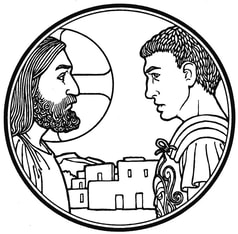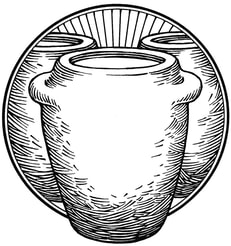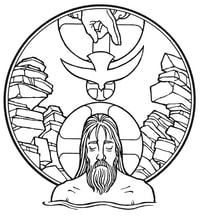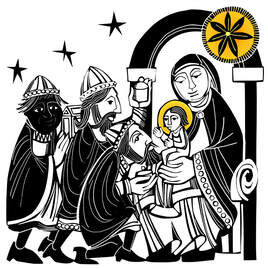Jesus Came for Gentiles, Too
The Gospel of Christ is the power of God to salvation for everyone who believes, for the Jew first and also for the Gentile (Rom. 1:8–17). Even in the Old Testament, the Gentiles were beneficiaries of God’s saving power. Though unimpressed at first with the Word of God, a Syrian commander is persuaded to receive that Word, and in the water he is cleansed and brought to faith in the God of Israel (2 Kings 5:1–15a). Evil is overcome by good (Rom 12:16–21). So also in the New Testament, a Roman centurion demonstrates great and humble faith in the Lord (Matt. 8:1–13). All he needs is the Word of Christ, for he trusts that Jesus’ Word of healing has authority to accomplish what it says. And indeed it does. The centurion’s faith is praised by our Lord above that of any Israelite. For the last shall be first, and the first last. Apart from faith in Christ, there is no salvation—not even for a Jew—but only weeping and gnashing of teeth.
1 Comment
Jesus' First Miracle Reveals God's Glory
The coming of the Messianic kingdom means the restoration of creation. The sign of this restoration is that “the mountains shall drip sweet wine” (Amos 9:11–15). When the elements of a fallen creation fail and run short at a wedding feast, our Lord Jesus steps in to restore creation and miraculously changes water into an abundance of the very best wine (John 2:1–11). With this sign, Christ manifests His glory. The “back” of God (Ex. 33:12–23) is revealed to those who believe. The hour will come when Jesus will again manifest His glory by taking creation’s curse into His own body to release us from its power. The Bridegroom will give His life for the Bride (Eph. 5:22–32), and from His side will flow water and blood, the holy sacraments by which she is cleansed and made one with Him. Through this sacrificial love of Christ we are enabled to “love one another with brotherly affection . . .” and to “outdo one another in showing honor” (Rom. 12:6–16).
In His Baptism, Jesus Takes His Place with Sinners
Our Lord Jesus is baptized “to fulfill all righteousness” (Matt. 3:13–17). He partakes of a baptism for sinners in order that He might be our substitute and bear the judgment we deserve. In the water, Jesus trades places with us. Our sin becomes His sin. His righteousness becomes our righteousness. Our glory, therefore, is in “Christ Jesus, who became to us...righteousness and sanctification and redemption” (1 Cor. 1:26–31). Jesus is the “chosen” One sent from the Father to release us from the prison house of sin and death (Is. 42:1–7). Baptized into Christ, we also become the chosen ones, beloved of the Father. We cross the Jordan with Jesus (Joshua 3) through death into the promised land of new life with God.
The Lord God Is Manifested in the Incarnate Son
The Feast of the Epiphany centers in the visit of the Magi from the East. In that respect, it is a “Thirteenth Day” of Christmas; and yet, it also marks the beginning of a new liturgical season. While Christmas has focused on the Incarnation of our Lord—that is, on God becoming flesh—the season of Epiphany emphasizes the manifestation or self-revelation of God in that same flesh of Christ. For the Lord Himself has entered our darkness and rises upon us with the brightness of His true light (Is. 60:1–2). He does so chiefly by His Word of the Gospel, which He causes to be preached within His Church on earth—not only to the Jews but also to Gentiles (Eph. 3:8–10). As the Magi were guided by the promises of Holy Scripture to find and worship the Christ Child with His mother in the house (Matt. 2:5–11), so does He call disciples from all nations by the preaching of His Word, to find and worship Him within His Church (Is. 60:3–6). With gold they confess His royalty; with incense, His deity; and with myrrh, His priestly sacrifice (Matt. 2:11).
|
Archives
February 2019
Categories
All
|
||||||||||||||||||||||||

 RSS Feed
RSS Feed
